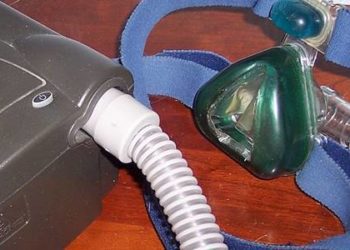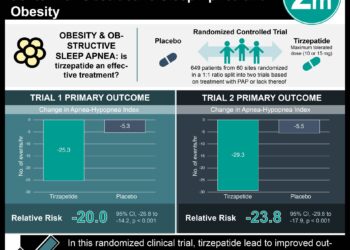CPAP may not decrease cardiovascular events in sleep apnea
1. Continuous positive airway pressure (CPAP) use did not decrease the incidence of the primary composite cardiovascular event end point.
2. CPAP did reduce snoring and daytime sleepiness and also improved health-related quality of life and mood.
Evidence Rating Level: 1 (Excellent)
Study Rundown: Obstructive sleep apnea (OSA) is known to be associated with increased risk of cardiovascular events, particularly stroke. CPAP is used as treatment for OSA but its unclear if its use is associated with decreased cardiovascular events. This randomized controlled trial was designed to evaluate the effectiveness of CPAP in reducing the rate of cardiovascular events among patients with OSA.
There was no significant difference in the primary composite outcome of death from cardiovascular causes, myocardial infarction, stroke or hospitalization for unstable angina, heart failure, or transient ischemic attack between the CPAP and sham CPAP groups. These results remained robust through individual analysis as well. However, CPAP did significantly reduce snoring and daytime sleepiness. Improvement in health-related quality of life and mood was also observed.
Click to read the study, published today in NEJM
Relevant Reading: Severity of OSA Is an Independent Predictor of Incident Atrial Fibrillation Hospitalization in a Large Sleep-Clinic Cohort
In-Depth [randomized controlled trial]: This international, multi-center, randomized, parallel-group, open—label trial with blind end-point assessment was conducted in 7 countries from 2008 to 2013. Patients between the ages of 45 and 75 with diagnoses of coronary artery disease or cerebrovascular disease and a diagnosis of moderate-to-severe OSA were included. Patients were excluded if they reported excessive daytime sleepiness, had very severe hypoxemia or had Cheyne-Stokes respirations. Patients were required to have a minimal level of CPAP adherence of 3 hours nightly. Patients were randomly assigned to CPAP therapy with usual care or usual care alone. The primary composite end point was death from cardiovascular events, myocardial infarction, stroke or hospitalization for unstable angina, heart failure, and transient ischemic attack. Secondary end points included other cardiovascular outcomes, health-related quality of life, snoring symptoms, daytime sleepiness and mood.
Of the 2717 eligible participants, 1359 were randomized to CPAP and 1358 randomized to usual care. The mean adherence to CPAP therapy was 3.3 hours per night and the mean apnea-hypopnea index decreased from 29.0 events per hour to 3.7 per hour during follow-up. Patients were followed for a mean of 3.7 years. In the CPAP group, 229 patients (17.0%) incurred the primary end point event; in the usual care group 207 participants (15.4%) incurred the primary end point event (HR with CPAP 1.10; 95%CI 0.91-1.32; p = 0.34). However, the study states that CPAP significantly reduced snoring and daytime sleepiness that was reported by the patient. Lastly, it improved health-related quality of life and mood.
Image: PD
©2016 2 Minute Medicine, Inc. All rights reserved. No works may be reproduced without expressed written consent from 2 Minute Medicine, Inc. Inquire about licensing here. No article should be construed as medical advice and is not intended as such by the authors or by 2 Minute Medicine, Inc.







![Adverse pregnancy outcomes associated with thrombophilias [Classics Series]](https://www.2minutemedicine.com/wp-content/uploads/2015/07/Classics-2-Minute-Medicine-e1436017941513-75x75.png)